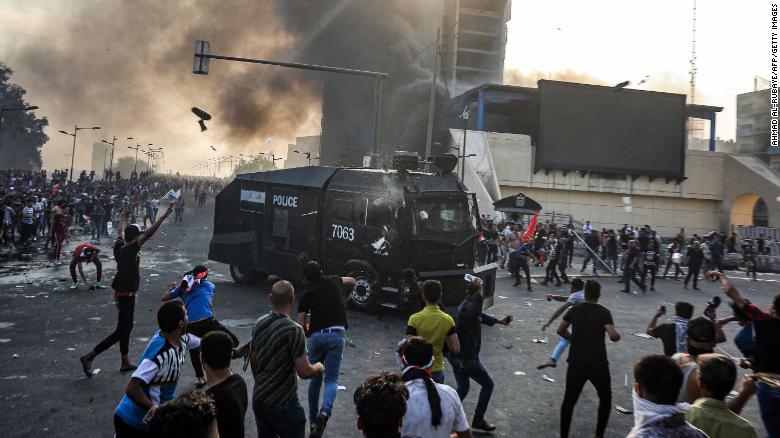Iraq's Lapse in Governing Aptitude
"I came out to the streets to ask for reform in my country and to find salvation from the mafias who have stolen my country and was greeted brutally by the security forces."
"We are peaceful protesters, but the security forces treated us with brutality, as if we were animals, not humans demanding our rights."
Ibrahim Ahmed Yusuf, 34, wounded protester, Tahrir Square
 |
Anti-government protesters set fires and close a street
during a demonstration in Baghdad on Sunday after nearly a week of
unrest throughout Iraq. Khalid Mohammed/AP
|
"This must stop."
"I call on all parties to pause and reflect. Those responsible for violence should be held to account. Let the spirit of unity prevail across Iraq."
"The use of force should be exceptional, and assemblies should ordinarily be managed without resort to force."
"Blanket internet shutdowns are likely to contravene freedom of expression, unduly restricting the right to receive and impart information and may exacerbate tensions."
Marta Hurtado, spokeswoman, United Nations high commissioner for human rights
 |
Anti-government protesters run for cover while Iraqi
security forces fire live ammunition in the air during a demonstration
in Baghdad on Sunday. Khalid Mohammed/AP
|
Tahrir Square which signifies by its name, liberation, freedom, is yet again a scene of protest and violence as it was in Egypt during the Arab Spring that gave so much hope throughout the Middle East where ordinary people rose up to demand an end to tyranny and an advance into democracy. Well, Egypt is once again experiencing protests in Tahrir Square (Martyrs Square), and Tahrir Square in Baghdad which never before did -- since the Arab Spring passed it by -- is now the scene of bloody violence and deadly repercussions.
On Sunday in Baghdad, another seven people were killed. The total tally for death of protesters at the hands of the Iraqi military now exceeds one hundred in Iraq, with thousands wounded. To look at the expressions on the faces of the photographed young men taking part in the pandemonium of the protests, they're enjoying themselves, having a good time flirting with danger, as though no bullet could penetrate their bodies. Until they do.
What distinguishes the Middle East quite particularly is the level of violence from both protesters and regimes levelled one against the other. Confrontations are deadly because those involved in them have deadly intent. The regimes because they must resist the street's pressure to overturn their rule, the protesters because they revile the corruption and corrosion of life at the hands of those with power and become willing to sacrifice whatever they have to confront their oppressors, and what they have to offer is their lives.
 |
| Protestors wave flags during a protest in Tahrir Square on October 1 CNN |
It may not be quite as noble as that, with a greater edge given to the culture of violence endemic in the Middle East itself. Tunisia, where it all began, just handled things differently, but then that country had one foot in its cultural-religious heritage, and another in its long-established emulation of Western-style democracy. The only death that occurred in Tunisia was that of the young fruit seller through self-immolation that set off the popular protests. Few others during the 28 days of protests died.
In Iraq, the past week has seen tens of thousands of Iraqis out on the streets in Baghdad and southern Iraq protesting government corruption, unemployment and dismal basic civil services. When the prime minister, Adil Abdul Mahdi, and speaker of the parliament met with protesters, nothing was resolved. It is the security services' vicious response that seems to signal the leadership has given them all the latitude they deem necessary to put a stop to the protests.
The Iraqi security forces are turning on the mostly young men protesting the lack of opportunities to find employment and security for their futures, as though they are terrorists, not citizens of a recently rededicated civil authority. The government's incompetence which is the source of these protests seeing support from intellectuals and the educated class, along with some political parties trying to advantage themselves, leaves it uncertain and isolated.
The unemployment rate at a time when the country should be seeing improvements resulting from increased oil revenues, infuriates Iraq's youth. It's clear that insufficient finances are being placed into government-initiated programs for job creation, much less civic services for the population. Security forces have been firing directly at protesters, and not into the air as a dispersal mechanism. As with Syria in 2011, the first protests were small and isolated.
When police and security forces responded violently, the protesters become more determined and the protesters grew in numbers of people willing to engage in protest. Despite which, ittle effort was made by the government to pull back the security forces' level of lethal violence. On Friday the Iraqi Federal Police stated that snipers, not part of the security forces, were aiming their deadly weapons at both the protesters and the police.

Labels: Government Ineptitude, Iraq, Protests, Violence
0 Comments:
Post a Comment
<< Home